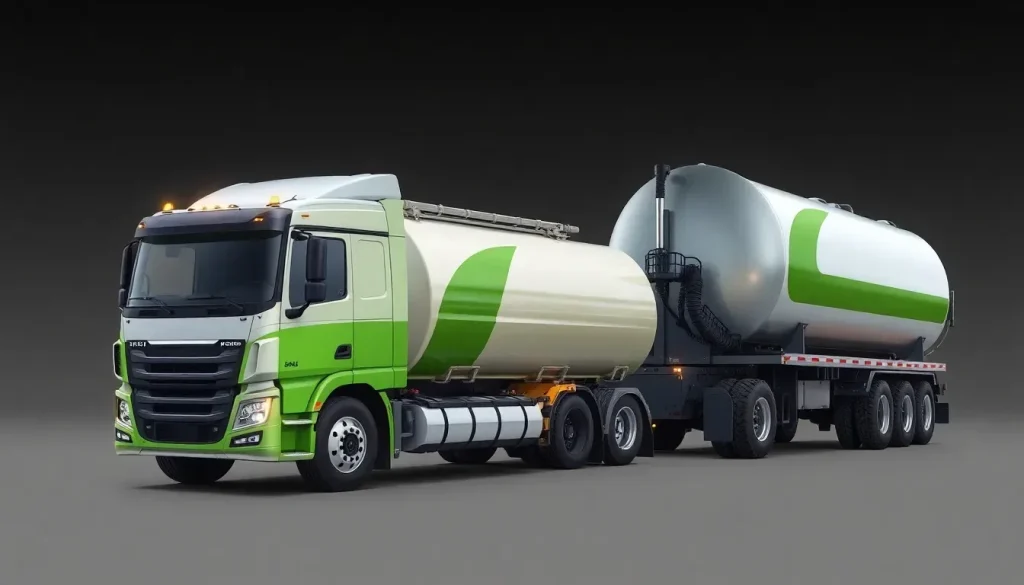Nortrans implements natural gas trucks for mountainous heavy loads

In a significant shift towards sustainable logistics, Nortrans is pioneering the use of natural gas-powered trucks in challenging terrains. This move not only highlights the potential of alternative fuels but also sets a precedent for the future of freight transport. As the industry grapples with environmental concerns, innovations like this could lead to a greener future.
Recently, Nortrans, based in Kelowna, British Columbia, has taken a bold step in the transportation sector by deploying one of the first commercially operated Kenworth T880 trucks powered by the Cummins X15N natural gas engine. This initiative marks a crucial development in the adoption of alternative fuel vehicles in the trucking industry.
Performance of the Kenworth T880 Natural Gas Truck
The Kenworth T880 is not just an ordinary truck; it is engineered to handle the rigorous demands of freight transport. Nortrans has successfully utilized this truck to transport full-weight loads from Revelstoke, BC, to Oroville, Washington, for Gorman Bros. Lumber. This route presents unique challenges due to the mountainous terrain, making it a perfect testing ground for the capabilities of the Cummins X15N engine.
According to Nortrans, the truck operates efficiently under real-world conditions, demonstrating the ability to maintain performance at full payloads. The engine provides a level of torque and reliability comparable to traditional diesel engines, making it an appealing option for fleet operators looking to transition to more sustainable practices.
Environmental Benefits of Natural Gas Trucks
One of the most compelling aspects of natural gas trucks is their environmental impact. The Cummins X15N engine is designed to significantly reduce harmful emissions, which is crucial in an era where climate change is a pressing issue. Key benefits include:
- Reduction in NOx emissions: Natural gas vehicles can cut nitrogen oxides (NOx) by 95% compared to diesel engines.
- Lower greenhouse gas emissions: These trucks can achieve a 30% reduction in greenhouse gases, contributing to cleaner air.
- Minimal particulate matter: Natural gas engines produce virtually no particulate pollution, which is essential for improving public health.
FortisBC, a local utility provider, emphasizes these benefits, suggesting that the transition to natural gas vehicles could play a significant role in reducing the carbon footprint of the transportation sector.
Infrastructure Support for Natural Gas Vehicles
A crucial factor in the successful deployment of natural gas trucks is the availability of fueling infrastructure. FortisBC is stepping up to provide the necessary support in Kelowna, while Clean Energy is expanding a fueling network across the region. This network includes strategically located fueling stations in key areas:
- Abbotsford
- Kamloops
- Kelowna
- Calgary
- Edmonton
Furthermore, the Canadian government, through its Green Freight Program, has played an integral role in financing the acquisition of natural gas vehicles. This collaborative approach between public and private sectors is essential for fostering innovation in the transportation industry.
Industry Implications and Future Prospects
Nortrans' initiative is more than just a pilot project; it serves as a beacon for the trucking industry, demonstrating that natural gas trucking is a viable and responsible option today, not just a future possibility. The company's commitment reflects a growing trend among fleet operators to prioritize sustainability while still meeting operational requirements.
Della Bond, account manager for low carbon transportation at FortisBC, states, "We have been working with fleet operators for over 15 years to transition from diesel to lower carbon fuels like compressed natural gas. This new CNG truck represents another step forward, enabling operators to lower emissions and save on fuel costs while ensuring reliability." This sentiment aligns with the broader industry trend towards greener technologies.
Additional Innovations in Natural Gas Transportation
As the industry evolves, several other innovations are emerging alongside natural gas technology. These developments may include:
- Biogas utilization: The use of biogas, a renewable source of natural gas, could further enhance sustainability.
- Electric hybrid systems: Combining electric power with natural gas can optimize fuel efficiency.
- Advanced telematics: Utilizing data analytics for route optimization helps in reducing fuel consumption.
Such innovations are paving the way for an even more sustainable transportation sector, which will be essential as regulations tighten and consumer expectations shift towards greener options.
Conclusion
Nortrans’ deployment of the Kenworth T880 natural gas truck not only illustrates the potential for cleaner freight transport but also highlights the industry’s responsibility to adopt sustainable practices. As more companies follow suit, the vision of a low-emission transportation sector becomes increasingly attainable.
For those interested in learning more about natural gas vehicles, you might find this video insightful:




Leave a Reply